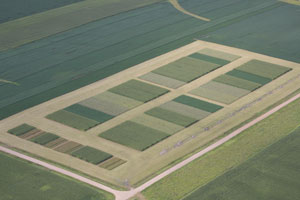How can microbes help us achieve sustainable agricultural productivity?
Bioenergy crops are grown specifically for the purpose of converting plant compartments or biomass into biofuels or bioproducts. They are part of our plan to meet the future’s energy demands, and we want to sustainably produce these resources. For example, we want to utilize ‘marginal’ lands that may have less water or nutrients than traditional farming systems but do so without creating outputs that would harm the environment.
Frequently, plants and microbes form symbiotic associations. These relationships often benefit the host plant, conferring tolerance to drought or other stress or making nutrients and other resources more accessible. The plant-associated microbiome and its potential benefits are a large part of our research program, especially as they apply to bioenergy crops. We want to understand how microbes are involved in nutrient cycling and losses, plant protection and resilience, and the impacts of management on the plant-microbe system.
We hope to improve understanding of the underlying mechanisms governing plant-soil-microbe interactions which explain key feedstock traits, such as yield, effects on soil carbon storage, and water and nitrogen use efficiencies. This information will help us predict the sustainability of different feedstocks and inform the economic viability and environmental outcomes associated with the production of various biofuels and bioproducts.
Collaborators
Emily Heaton, ISU Marshall McDaniel, ISU Andrew Vanloocke, ISU
Funding
This project is funded by the DOE and is part of the Center for Advanced Bioenergy and Bioproducts Innovation.

